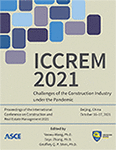Study on Sponge Campus Design of Ren’ai College of Tianjin Oriented by Low-Impact Development Measures
Publication: ICCREM 2021
ABSTRACT
Ren’ai College of Tianjin as the research object was studied. By analyzing current situation of the campus, the runoff coefficient of each partition was calculated. Then various technical measures of low-impact development were applied to campus sponge reconstruction. SWMM software was used to calculate the runoff coefficient after the reconstruction of sponge campus. The impact of runoff coefficient of the campus by low-impact development measures was simulated. It was concluded that the runoff coefficient in the campus had 15% reduction by low-impact development measures.
Get full access to this article
View all available purchase options and get full access to this chapter.
REFERENCES
Cai, H. (2017). Decoding Sponge City in Shenzhen: Resilience Program or Growth Policy. Massachusetts Institute of Technology, Massachusetts, U.S., 1–68.
Chang, X. D., Xu, Z. X., and Zhao, G. (2017). “Simulation of urban rainfall-runoff and impact assessment of low impact development facilities based on SWMM model: a case study in Qinghe catchment in Beijing.” Journal of Hydroelectric Engineering, 35(11), 84–93. (in Chinese).
Dietz, M. E. (2007). “Low impact development practices: a review of current research and recommendations for future directions.” Water, air and soil pollution, 186(1-4), 351–363.
Guo, X. W., and Zhang, H. X. (2020). “Effect assessment of campus sponge construction project based on model and online monitoring.” China Water & Wastewater, 36(16), 1–11. (in Chinese).
Jia, H., Yao, H., and Shaw, L. Y. U. (2013). “Advances in LID BMPs research and practice for urban runoff control in China.” Frontiers of Environmental Science Engineering, 7(5), 709–720.
Lin, M., and Yu, K. J. (2012). “Structure the urban green spone: study on planning an ecological storm water regulation system.” Urban Studies, 19(5), 4–8.
Sang, Y. F., and Yang, M. Y. (2017). “Urban water logs control in China: more effective strategies and actions are needed.” Natural Hazards, 85(2), 1291–1294.
Wang, M. J., Wu, Z. P., and Sun, Y. (2019). “Research and practice of ‘sponge campus’ conceptual planning based on low impact development.” Architecture & Culture, (8), 204–206. (in Chinese).
Wang, E. S., Li, J. Q., and Liu, C. (2017). “Discussion on mechanism guarantee system of sponge city development.” Water & Wastewater Engineering, 43(6), 57–62. (in Chinese).
Xu, H. W., Chen, W., and Liang, Y. W. (2018). “Discussion on the legislation of sponge city construction.” Urban-Rural Development, (13), 21–23.
Zhang, S. H., Shen, H. B., and Chen, J. G. (2016). “The application of regulating urban rainwater discharge in sponge type community.” Beijing Water, (2), 1–5. (in Chinese).
Information & Authors
Information
Published In
Copyright
© 2021 American Society of Civil Engineers.
History
Published online: Dec 9, 2021
Authors
Metrics & Citations
Metrics
Citations
Download citation
If you have the appropriate software installed, you can download article citation data to the citation manager of your choice. Simply select your manager software from the list below and click Download.
